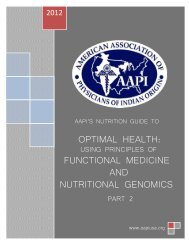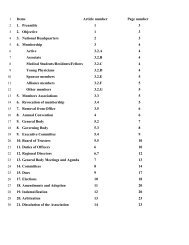functional medicine and nutritional genomics - American Association ...
functional medicine and nutritional genomics - American Association ...
functional medicine and nutritional genomics - American Association ...
Create successful ePaper yourself
Turn your PDF publications into a flip-book with our unique Google optimized e-Paper software.
AAPI’S NUTRITION GUIDE TO OPTIMAL HEALTH: USING PRINCIPLES OF FUNCTIONAL MEDICINE AND NUTRITIONAL GENOMICS<br />
Why is gastrointestinal health so important to my<br />
patient?<br />
Gastrointestinal health, often simply called ‚gut health‛,<br />
is central to physiologic balance <strong>and</strong> wellness.(9) The<br />
gastrointestinal system is responsible for a wide variety<br />
of metabolic, <strong>nutritional</strong>, <strong>and</strong> detoxification<br />
processes.(10) Furthermore, the bacteria located<br />
within the intestines are intimately involved with our<br />
metabolic functioning. The 100 trillion bacteria living<br />
within our intestinal system contains more genetic<br />
material than the human body <strong>and</strong> performs more<br />
metabolic processes than our liver. The gut<br />
environment can be viewed as another organ system.<br />
Approximately 70-80% of our immune system cells<br />
are located around the gastrointestinal system <strong>and</strong><br />
there appears to be a close relationship between the<br />
immune system <strong>and</strong> the gut flora. There is evidence<br />
that these bacteria play a role in immune modulation<br />
<strong>and</strong> recognition of ‚self‛ that occurs during the early<br />
years of extrauterine life.(14) Containing over 1000<br />
species of bacteria, yeast, <strong>and</strong> parasites, the balance<br />
of these living organisms can support nutrient<br />
synthesis, detoxification, <strong>and</strong> immune balance or set<br />
the stage for inflammation <strong>and</strong> intestinal hyperpermeability.(11)The<br />
food that we eat is also food for<br />
the organisms living within our gut <strong>and</strong> our food<br />
choices influence the balance of bacteria.(8)<br />
Eating right is hard. Even people with chronic disease<br />
tend to believe that they eat normally; however, few<br />
people eat in a manner that is physiologically sound.<br />
We often eat highly processed, nutrient poor foods<br />
rapidly under higher stress conditions (think drivethru!)<br />
which sets the stage for inadequate digestion,<br />
malabsorption, <strong>and</strong> chronic disease.(12,13) Digestion,<br />
although not the focus of this primer, plays such a<br />
significant role in gut health, the intestinal biome, <strong>and</strong><br />
ultimately the function of our immune system that it<br />
deserves a brief discussion.<br />
Proper digestion takes time <strong>and</strong> preparation. This<br />
includes eating foods that our body can digest, with<br />
reasonable nutrient, fat, fiber, protein, <strong>and</strong> carbohydrate<br />
intake; preparing food properly, in a low stress<br />
environment, allowing for production of stomach acid<br />
<strong>and</strong> pancreatic enzyme synthesis. Taking the time to<br />
thoroughly chew the food, in reasonable portions, with<br />
74<br />
plenty of time between bites will allow the bolus of<br />
food time to be broken down within the stomach.<br />
As you can see, proper digestion requires real food<br />
<strong>and</strong> time to prepare <strong>and</strong> eat the food. Food choices,<br />
eating habits, digestion, the gut flora, <strong>and</strong> elimination<br />
all influence the integrity of the gut, preventing or<br />
setting the stage for food sensitivity, <strong>and</strong> ultimately<br />
immune dysfunction, inflammation, <strong>and</strong> chronic<br />
disease.(10,11)<br />
How does Food Sensitivity impact gut health?<br />
2012<br />
The development of food sensitivity is the end result of<br />
multiple inter-related chronic problems of the digestive<br />
tract, such as poor digestion, abnormal bacterial growth<br />
within the gut, <strong>and</strong> chronic gut inflammation. In other<br />
words, gut problems precede the development of food<br />
sensitivity. However, determining <strong>and</strong> removing foods<br />
that cause inflammation can be an important part of<br />
breaking the cycle of chronic inflammation.<br />
Isn’t Food Sensitivity just an allergy?<br />
All allergy <strong>and</strong> most sensitivity or intolerances to food<br />
are mediated by the immune system. Lactose<br />
intolerance, which is due to an enzyme deficiency, is<br />
an example of a non-immune mediated food<br />
intolerance.(27)<br />
Most clinicians think about the production of IgE<br />
antibody when they encounter allergy type symptoms<br />
<strong>and</strong> when they are considering food as a potential<br />
source of disease.<br />
IgE is an antibody produced by the B-lymphocyte, part<br />
of the acquired arm of the immune response. IgE is<br />
responsible for causing the release of histamine from<br />
mast cells <strong>and</strong> histamine mediates the allergic<br />
symptoms of swelling <strong>and</strong> redness.<br />
IgG is another form of antibody responsible for long<br />
term immune memory. For instance, IgG is formed<br />
after the acute phase of a viral infection, preventing<br />
reinfection upon further exposure.<br />
Immunotherapy (‚allergy shots‛) can help us<br />
underst<strong>and</strong> the function of these antibodies in a<br />
practical way. Immunotherapy is an effective means of<br />
reducing the symptoms of allergy by chronically

















